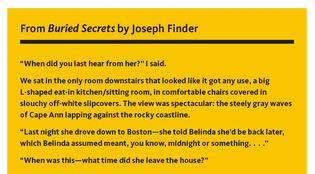 loading
loading
Spymasters Excerpt from Buried Secrets by Joseph Finder. View full image
Company man I’ve known Joseph Finder off and on for nearly thirty years, ever since we met in Moscow. I was a reporter for BusinessWeek magazine, and he was researching his first book—Red Carpet, a nonfiction account of American business titans’ squirrelly dealings with Vladimir Lenin, Josef Stalin, and assorted Soviet-era nogoodniks. Finder says that when he was a student, a professor invited him to Mory’s to recruit him for the CIA. (He declined.) Much more important to his future career was his membership in the Whiffenpoofs: the group’s upscale singing engagements put him cheek by jowl with the likes of President George H. W. Bush ’48, the King of Jordan, and Princess Grace. “I’m this public high school kid admitted from upstate New York, and at Yale, I learned that there really was such a thing as the Establishment, and that it had a lot of power,” Finder says. “That kind of proximity to the rich and famous sort of inspired the idea of the international thriller in me.” Once he graduated, Finder found that other well-connected Old Blues were happy to abet his spywriting research. Even James Jesus Angleton ’41, the famously suspicious CIA counterintelligence chief and mole hunter, helped out. “I think Angleton agreed to see me just because I went to Yale, and he gave me some good leads about Armand Hammer’s activities in Moscow,” Finder says. (Red Carpet revealed that the business tycoon had close ties to Soviet intelligence.) “Averell Harriman [’13] spent time with me—I suspect for the same reason. He let me into his personal archive, and then he forgot about me. I was reading letters between him and Trotsky.” Finder worked that experience into a scene in his first novel,The Moscow Club (1991), in which CIA analyst Charlie Stone picks a lock on the secret files of Winthrop Lehman, a Harriman-esque “heir to a railroad fortune.” There he discovers a document about a mole working inside the USSR, and the plot takes off. But after the USSR turned back into Russia, Finder abandoned the Cold War, and now his moles and conspirators tend to work in large corporations or the US government. The young protagonist of Paranoia, caught stealing from the company where he works, makes a deal with the devil—in the person of his CEO, who explains the job of corporate spy thus:
Finder is currently working on the third of his series featuring Nick Heller, ex-military special operative turned twenty-first-century private spy for hire. Finder had written eight stand-alone novels, four of them best sellers, before he decided to establish a series character—“a crass, calculated, commercial decision,” he jokes. “The publishers want you to do a book a year, and if you have the hero already figured out, that’s a head start. Readers establish loyalty to characters. They don’t really care about authors.” Writing about moles and electronic snooping devices for a living can affect one’s view of the world. Finder, a graduate of the FBI’s Citizens’ Academies and thoroughly steeped in intelligence lore, has Angleton-like leanings. Soon after Dominique Strauss-Kahn’s infamous sexual encounter in his Sofitel hotel room, Finder posted this message on Facebook:
But on the subject of his writing, Finder is down to earth. “This is a tough genre to define,” he says. “We all write for a very large audience, and you come to admire the twisty story told with suspenseful and elegant prose that’s transparent but not self-aware. There is something in between popcorn fluff and Philip Roth. There is suspense fiction that is powerful and moving and that captures something distinctive about our lives and culture. That is our profession.”
The comment period has expired.
|
|